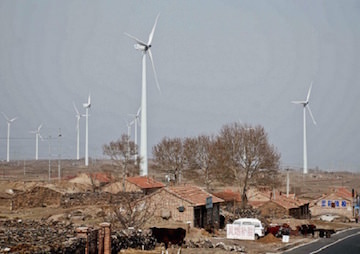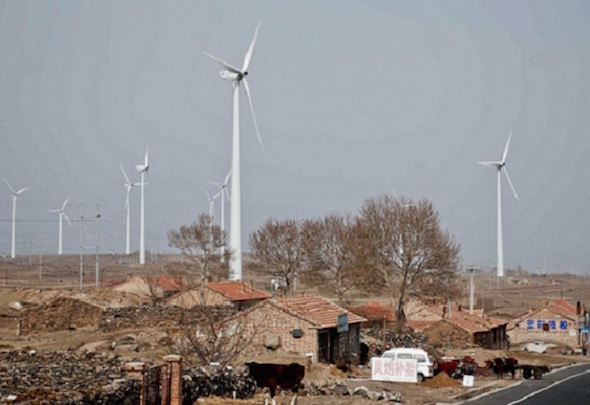World Must Wake Up to China’s Energy Revolution
A new report says a successful outcome at this year’s Paris climate talks will be far more likely if the world takes note of how China is reducing emissions.
By Kieran Cooke, Climate News Network

A wind power project in a village in Hebei province, northeast of Beijing. (Asian Development Bank via Flickr)
This Creative Commons-licensed piece first appeared at Climate News Network.
LONDON — The pace of change in China’s energy policy means that the targets it has set for cutting greenhouse gases (GHGs) are likely to be achieved sooner than expected, according to a new study.
As part of a joint China/US agreement last November on tackling climate change, China said its GHG emissions — the highest in the world — would peak in 2030 and subsequently decrease. It could now be five years ahead of schedule.
The joint study by the London School of Economics (LSE) and the Grantham Research Institute on Climate Change and the Environment says that wholesale changes taking place in energy and industrial policy mean that China’s emissions are, in fact, likely to peak in 2025 — and fall sharply thereafter.
The report says: “The United Nations Framework Convention on Climate Change in Paris later this year will be more successful if governments everywhere understand the extent of change in China, its implications for global emissions, and the positive impact that China’s clean industrial development, investment and innovation plans are likely to have on global markets for clean goods and services.”
Likely to plateau
The authors — including Nicholas Stern, who produced the Stern Report in 2006 on the implications of climate change for the world economy — say that China’s use of coal, which is by far the most polluting fossil fuel, is likely to plateau over the next five years.
Quoting official statistics, the report says China’s coal consumption fell by nearly 3% last year, and has fallen more steeply in the first months of 2015. Meanwhile, coal imports fell by 11% in 2014 and by 45% in the first three months of this year.
In recent years, there has been mounting concern over the environmental and health costs of China’s fast-track economic growth. The President, Xi Jinping, has said the country’s current economic model is “unbalanced, uncoordinated and unsustainable”.
“A fundamental shift is taking place – away from heavy industries primarily reliant on coal to more service-orientated, sustainable activities”
Particulate matter pollution has been linked to 1.23 million deaths in 2010 — equivalent in monetary terms to a loss of between 10% and 13% of gross domestic product.
Now, says the LSE report, a fundamental shift is taking place in China’s economy — away from heavy industries primarily reliant on coal to more service-orientated, sustainable activities. Massive investments are being made in renewable energies such as solar and wind power.
Much still needs to be done if China’s GHG emissions are to decrease, the study says. It recommends that a coal tax should be brought in, with funds raised being used to encourage clean energy innovation. Energy savings can also be made through long-term, sustainable plans, such as building high-density, energy-efficient cities.
The study’s authors say that what’s happening in China has a profound effect elsewhere. A cut in China’s emissions means that the goal of keeping a rise in average global temperatures to 2?C above pre-industrial levels by mid-century becomes more achievable. Also, other developing nations are influenced by China and are likely to follow its lead in tackling climate change.
Despite the progress being made on China’s emissions reductions, analysts point out that the country is likely to be dependent on coal for many more years. China still produces and consumes nearly as much coal as the rest of the world combined.
Concerns raised
Although its renewables sector is growing fast, it still accounts for only a small portion of total generating capacity, and concerns have been raised about the impacts of China’s large-scale hydroelectric generation programme.
Some experts have criticised the country’s big investments in nuclear power plants, arguing that it is being undertaken without sufficient planning and consideration for safety.
Also, while China is taking steps to cut back on coal use, other countries — particularly India — are intent on continuing to make use of coal resources that often are heavily subsidised.
Earlier this month, the international charity Oxfam called on world leaders to phase out the use of coal to save lives, money and the planet.
Your support matters…Independent journalism is under threat and overshadowed by heavily funded mainstream media.
You can help level the playing field. Become a member.
Your tax-deductible contribution keeps us digging beneath the headlines to give you thought-provoking, investigative reporting and analysis that unearths what's really happening- without compromise.
Give today to support our courageous, independent journalists.






You need to be a supporter to comment.
There are currently no responses to this article.
Be the first to respond.